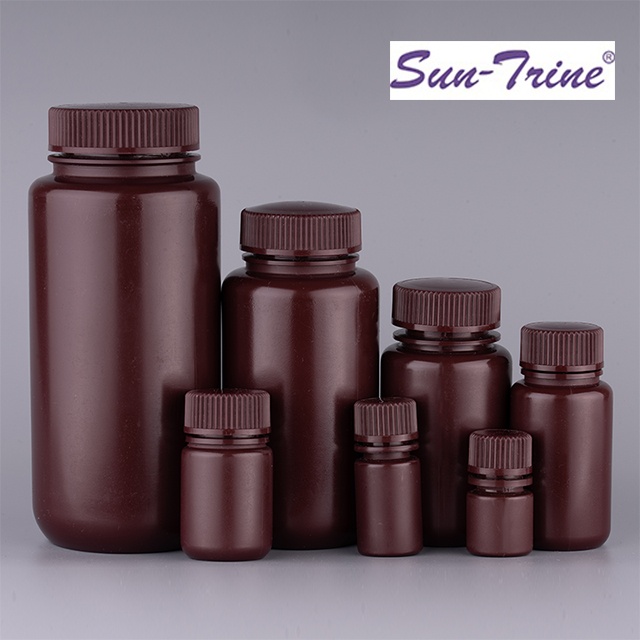Introduction
In laboratories and scientific settings, the choice of containers for reagents, chemicals, and substances is critical. This article delves into the distinctive attributes and variances between 1000ml Glass Reagent Bottles and their plastic or polyethylene counterparts commonly used in laboratory environments.

Material Composition and Durability
- Glass Reagent Bottles
1000ml Glass Reagent Bottles, crafted from high-quality glass, boast exceptional durability and robustness. The composition of borosilicate glass renders them resistant to chemical corrosion and scratches, ensuring the integrity of stored substances.
- Plastic or Polyethylene Bottles
Conversely, plastic or polyethylene bottles, while lightweight, may have varying compositions. They offer a level of durability but are susceptible to chemical interactions and scratching, potentially compromising the containment of sensitive substances.
Chemical Compatibility and Reagent Storage
- Glass Reagent Bottles
Glass bottles excel in compatibility with various reagents and chemicals. They effectively preserve substance integrity without leaching, making them ideal for long-term storage of sensitive compounds.
- Plastic or Polyethylene Bottles
Plastic or polyethylene containers, though suitable for certain chemicals, may face limitations with highly reactive substances due to potential interactions, leaching, or permeation issues.
Clarity, Transparency, and Visibility
- Glass Reagent Bottles
Glass offers unparalleled clarity and transparency, allowing for effortless content visibility. Monitoring contents and taking precise measurements are easier due to the clear nature of the material.
- Plastic or Polyethylene Bottles
While plastic containers offer varying levels of transparency, their clarity might be less than optimal. The visibility of contents could be limited compared to glass, potentially affecting accurate assessments.
Environmental Impact and Sustainability
Glass Reagent Bottles
Glass stands out in terms of eco-friendliness and recyclability. It's considered a sustainable choice due to its ability to be recycled and reused without losing its integrity.
Plastic or Polyethylene Bottles
Plastic containers pose environmental concerns due to their reliance on non-renewable resources and potential issues with recycling. Their environmental impact may be higher compared to glass.
Cost-effectiveness and Longevity
Glass Reagent Bottles
While glass bottles may require a higher initial investment, they offer long-term cost-effectiveness and durability. Their longevity and potential for reuse contribute to their overall value.
Plastic or Polyethylene Bottles
Plastic containers might be more affordable initially but may incur higher costs over time due to wear and tear, needing frequent replacement, and potentially shorter lifespan.
Suitability for Specific Laboratory Applications
- Glass Reagent Bottles
1. Pharmaceutical Laboratories
Suitability:1000ml Glass Reagent Bottles are well-suited for pharmaceutical laboratories due to their excellent chemical inertness and non-reactive nature. They are ideal for storing and preserving sensitive medications, compounds, and reagents without compromising their integrity.
2. Analytical Chemistry
Suitability: In analytical chemistry, precision and accuracy are paramount. Glass bottles, renowned for their clarity and resistance to chemical interactions, are indispensable for accurately storing and measuring solutions, standards, and calibration materials.
3. Long-term Storage of Delicate Compounds
Suitability: Laboratories requiring long-term storage of delicate compounds or solutions benefit from the stability and non-permeability of glass bottles. These bottles ensure the integrity and stability of the stored substances over extended periods.
4. Chemical Research and Development
Suitability:1000ml Glass Reagent Bottles play a vital role in chemical research and development due to their resistance to chemical corrosion. They are used for storing a wide range of chemical reagents and compounds utilized in various experiments.
- Plastic or Polyethylene Bottles
1. Routine Laboratory Tasks
Suitability: Plastic or polyethylene bottles find applicability in routine laboratory tasks where immediate disposability and convenience are prioritized. They are often used for temporary storage of common solutions or reagents used in daily lab procedures.
2. Short-term Storage of Less Reactive Substances
Suitability: These containers are suitable for short-term storage of less reactive substances where long-term stability and chemical interactions are not significant concerns. They are commonly used for storing general-purpose laboratory solutions.
3. Field Studies and Outdoor Applications
Suitability: In field studies or outdoor settings where durability and lightweight containers are required, plastic or polyethylene bottles offer convenience. They are often utilized for sample collection and transport due to their portability.
4. Cost-effective Experiments and Educational Labs
Suitability: Plastic containers are preferred in educational laboratories and cost-effective experiments where affordability and easy disposal take precedence over long-term durability or chemical inertness.
Considerations for Selection
The choice between1000ml Glass Reagent Bottles and plastic or polyethylene containers in laboratories hinges on several factors
Nature of Stored Substances: Glass bottles are ideal for delicate, reactive, or long-term storage, while plastic containers suit less reactive, short-term storage needs.
Precision and Accuracy Requirements: Glass offers superior clarity and chemical inertness, ensuring accurate measurements, making it favorable in analytical labs.
Environmental Impact: Glass is recyclable and eco-friendly, while plastic containers may pose environmental concerns due to their reliance on non-renewable resources.
Plastic or Polyethylene Bottles
Plastic containers find usage in scenarios where cost-efficiency and immediate disposability are prioritized, such as routine tasks or short-term storage of less reactive substances.
Conclusion
The distinctions between 1000ml Glass Reagent Bottles and plastic or polyethylene lab containers encompass material composition, durability, chemical compatibility, transparency, environmental impact, cost-effectiveness, longevity, and suitability for specific applications. The choice between these containers in laboratory settings hinges on a careful evaluation of their unique characteristics and their alignment with the requirements of the intended applications.
Related Products





